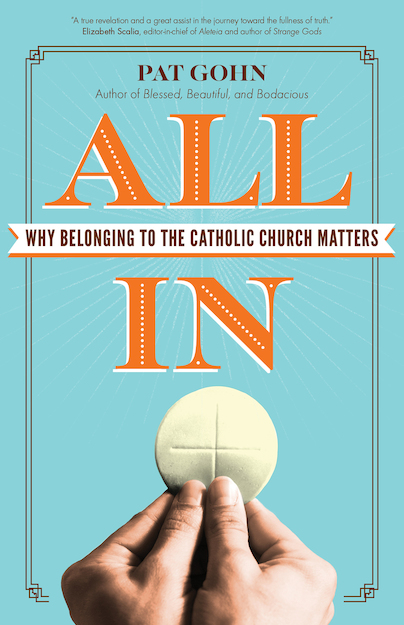
An Excerpt from
ALL IN: Why Belonging to the Catholic Church Matters
Confidence in the Church as a Mother
Pope Francis has a deep devotion to Mary. Yet, he also speaks lovingly of the Church as a mother. He says, “The birth of Jesus from the womb of Mary, in fact, is the prelude to the rebirth of every Christian in the womb of the Church.” (General Audience, September 3, 2014)
The Incarnation brings deep meaning to the Church, and to this idea of the Church being our Mother. God has linked Mary’s motherhood with that of the Church, as she is the mother of its founder, Jesus Christ. Thanks to the Incarnation of Jesus, God’s fatherhood is made known to us in the face and life and work of Jesus.
Jesus’ great love for his Bride, the Church, makes the Church a fruitful mother of many spiritual children, born through Baptism. The Church nurtures them though the Word of God and the graces of the seven sacraments. Therefore, the family of God is born of the fatherhood of God and the motherhood of the Church.
St. Cyprian, another third-century bishop and martyr, famously taught this easy-to-recall aphorism: “No one can have God as Father who does not have the Church as Mother” (CCC, 181).
Origen, a third-century theologian, repeated Cyprian’s sentiment, “He who leaves the Church makes himself responsible for his own death . . . He who does not have the Church as his mother cannot have God for father.”
These are powerful and sometimes harsh-sounding words to our modern ears. Yet the Early Church was a persecuted Church. It spoke in strident ways to be clear in announcing to its audience the necessity of belonging to the Church and adhering to its teachings.
St. Augustine, a fourth-century bishop, described the baptismal font as the uterus of the Mother Church. He taught, “The Church is a mother for us . . . it is from her that we were born spiritually . . . No one can find a paternal welcome from God if he scorns his mother, the Church.”
[tweet "Peek into 'All In' by @Pat Gohn: explore motherhood of the #Church. @avemariapress"]
A Mother Different Than We Might Expect
The Church as a mother operates both similarly and differently to mothers of human families.
The similarity of Mother Church to our human mothers is that she gives birth, via Baptism, to children of her beloved Spouse. She longs that her children will experience the love and identity of being in God’s family. The food and sustenance she provides are graces and blessings. Mother Church speaks words that unite her family. She opposes division. She longs for communion with each and every child she brings to birth. She offers her teaching so her children can grow strong and wise and capable in the Christian life. She yearns that her children find the fullness of life in this world and in the next.
There are dissimilarities between the Mother Church and human mothers, too. The upbringing many of us have experienced is one where grown children leave the sphere of a mother’s influence. Most leave home and start homes of their own. Yet Mother Church’s children are not only are born in her but they are born to never leave her. They are called to stay and to find communion with one another. There her children can be fed and have the graces of the sacraments lavished upon them. If children depart from her, they depart from the spiritual food and nourishment they need. As we heard from Cyprian and Augustine, our salvation depends on our union with our mother, the Church.
In the heart of every child is the natural desire to think highly of its mother, with great affection. Yet sometimes as we grow, we can have disagreements or disillusionments with our mothers. No natural mother can love her children perfectly. All human love suffers from brokenness to some degree.
Human frailties affect our relationship with the Church. We get hurt in the natural life. Sometimes our natural relationships with the people who make up the Church are upsetting, and we let it cause a split with our mother, the Church. Often when dealing with disappointments, we have seen only the human side of the Church, the human side that sins, without recalling the divine part of the Church. Yet grace’s power can help us forgive seventy times seven times! (See Mt 18:22.)
As some of us have matured in our natural lives, we find the fortitude and the wisdom to make peace with our mothers in our families of origin, whom we may have disagreed with or been estranged from. The same needs to hold true in the spiritual life.
The divinity of Mother Church comes from her union with Jesus Christ. The part of the Church that is linked with her divine Spouse, Jesus, calls us to return home, to be open to being healed by the graces of communion.
Today many children of God have been ignoring or, worse, scorning their mother, the Church. Some behave as if they have no mother at all. They have no sense of belonging to the Body. Many of us have willfully decided to go our own way. This is why I’ve spent so much time talking about belonging. Belonging is a two-way street.
No matter where guilt for the breach lies, we can look to the apostles and the saints to tell us the truth: Mother Church is real and is the source for all the graces we need on this side of eternity. This does not negate or excuse the sins of those Catholics in the Church—the human side—who may have hurt or disappointed us. But grace gives us the power to forgive and offer a kinder look toward our offenders who have lost their way.
This is good advice from the late Catholic author Henri Nouwen, S.J.:
When we have been wounded by the Church, our temptation is to reject it. But when we reject the Church it becomes very hard for us to keep in touch with the living Christ. When we say, “I love Jesus, but I hate the Church,” we end up losing not only the Church but Jesus too. The challenge is to forgive the Church. This challenge is especially great because the Church seldom asks us for forgiveness, at least not officially. But the Church as an often fallible human organization needs our forgiveness, while the Church as the living Christ among us continues to offer us forgiveness. (Forgiving the Church)
We must not forsake, by our negative struggles with pride, ignorance, neglect, or unresolved hurts, what God has given us in the Catholic Church. Mother Church can supply the graces and opportunities we need to heal. Renewal of our relationship with the Church is worthy of our efforts. As in all relationships, our attempts to come together are always more blessed than stalwart separations. Communion is always better than isolation. What God has joined together, let us not separate.
The Church is a family. We must live the “we” of the Church, not stay stuck in the church of “me.” Like family who share DNA and familial characteristics, we share a common Father and Mother. We have a Beloved Brother in Jesus, whose blood we share as we hold to a common creed, sacraments, and worship.
The Church as mother was part of the Father’s will for us, to nurture the divine life in us. We never outgrow our need for our Mother Church, the Mater Ecclesia, until we reach heaven.
Buy this book through our Amazon link and support CatholicMom.com with your purchase!
Be sure to check out our Book Notes archive.
Copyright 2017 Pat Gohn
This excerpt from All In is reprinted with the kind permission of Ave Maria Press.
About the Author

Pat Gohn
Pat Gohn is a married empty-nester with three adult children and four grandchildren. An author, catechist, speaker, and host of the Among Women podcast since 2009, her books include the award-winning Blessed, Beautiful, and Bodacious: Celebrating the Gift of Catholic Womanhood, and All In: Why Belonging to the Catholic Church Matters. She works in Catholic publishing as an editor. Visit PatGohn.net



.png?width=1806&height=731&name=CatholicMom_hcfm_logo1_pos_871c_2728c%20(002).png)
Comments